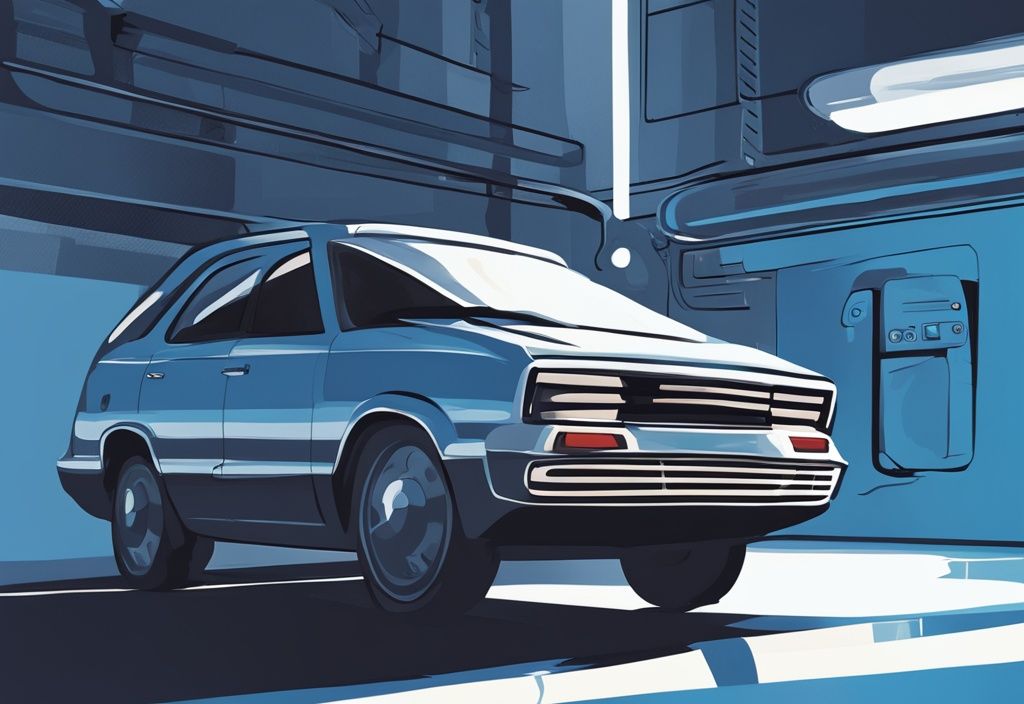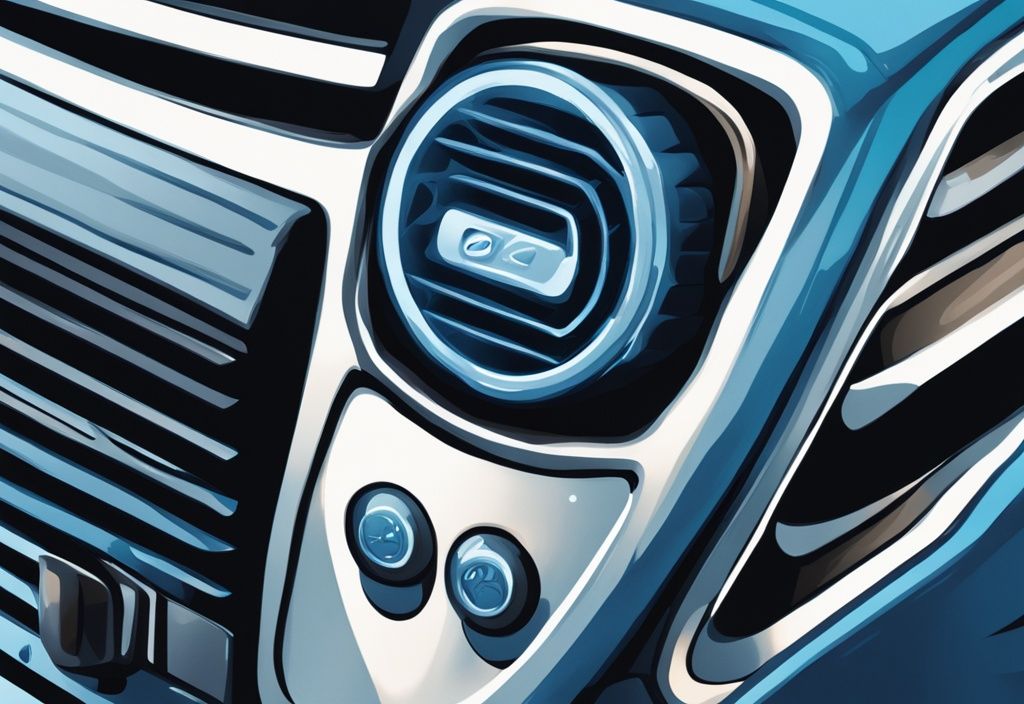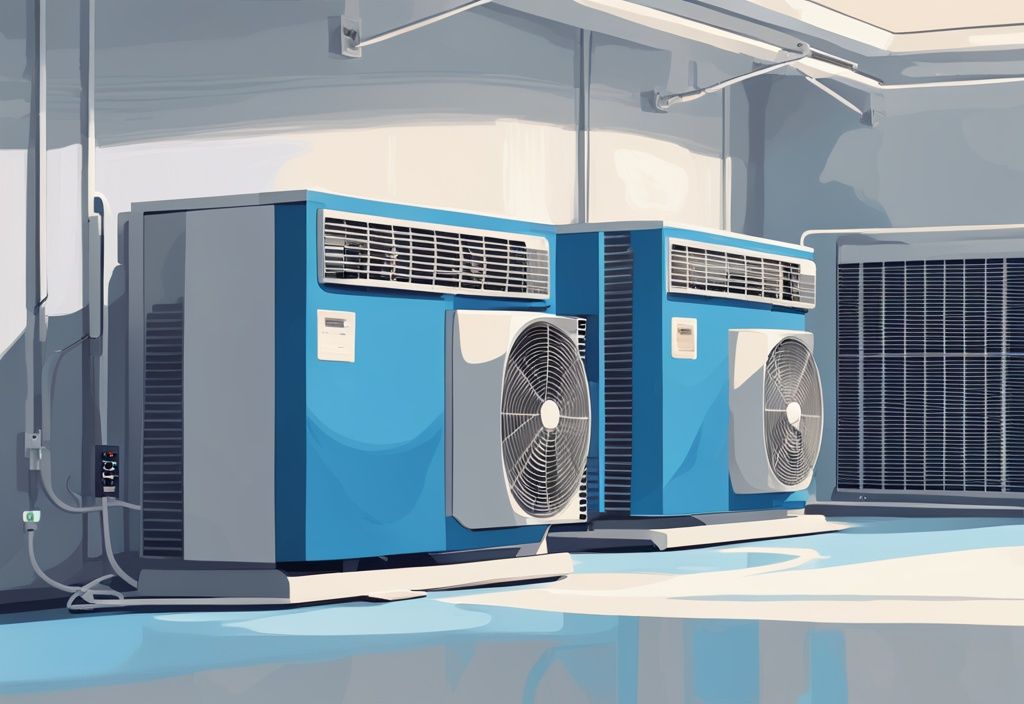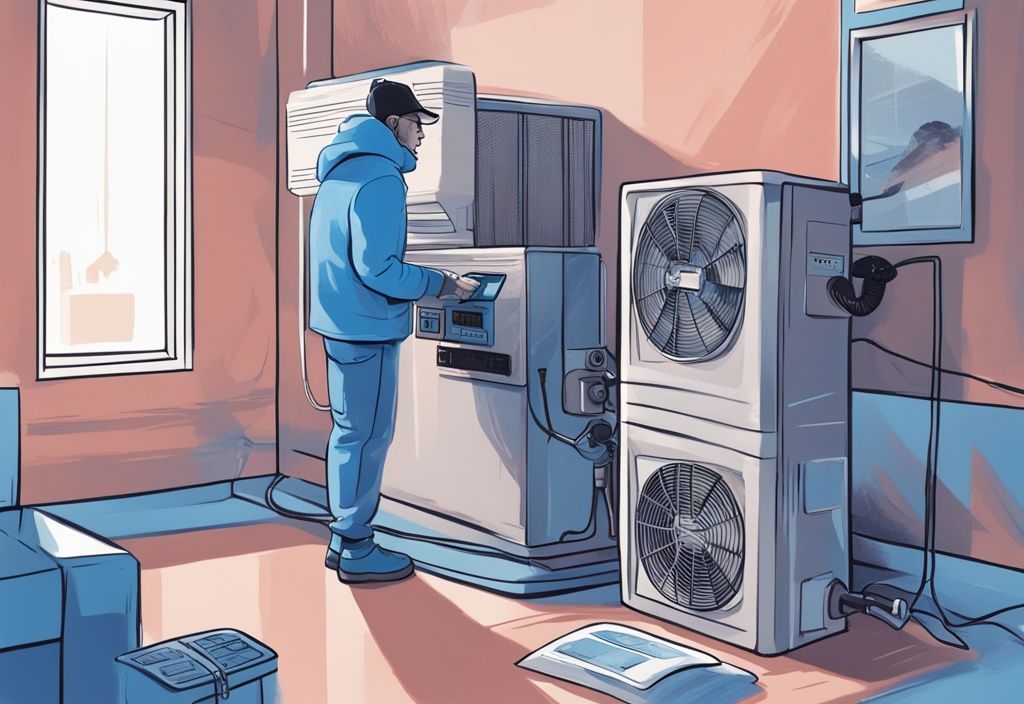Troubleshoot Hissing Sound from Car AC: Expert Repair Guide
Introduction
Ever heard a hissing sound from your car AC and wondered what the heck was going on? You, my friend, are not alone! Many people face this common issue that often signals a hidden problem in your cooling system. It could range from harmless to hazardous, like a minor seal issue or a gnawing refrigerant leak.
As a seasoned HVAC technician, I’ve seen these issues more times than I can count! In this article, I’m sharing some golden nuggets on the causes behind that pesky hissing sound, and how you can eliminate it without breaking a sweat or the bank.
So, buckle up! Not only will you learn about potential problems and solutions, but I’ll also guide you on preventing more significant issues down the road. Welcome aboard – let’s kick that annoying hissing sound to the curb together.
What Does a Hissing Sound from Car AC Indicate?
A hissing sound from your car AC can be both confusing and alarming. This noise usually means there’s an issue within the air conditioning system that needs immediate attention. Here’s a detailed breakdown of what this hissing sound could mean:
Operational Context:
The hissing noise generally becomes more noticeable when the AC is actively running, especially at higher settings. Higher load conditions put more stress on the system, potentially aggravating underlying issues.
Potential Causes:
Several factors could be responsible for the hissing sound in your car’s AC:
- Refrigerant Leak: A common cause is a refrigerant leak. When refrigerant escapes from the system, it not only reduces cooling efficiency but also creates a distinct hissing sound due to escaping gas. Addressing this quickly can prevent further damage.
- Component Malfunction: Any malfunctioning component, like the compressor or expansion valve, can cause irregularities that result in hissing noises. These components are crucial for regulating refrigerant flow and maintaining the system’s pressure balance.
- Pressure Irregularities: Imbalances in pressure within the AC system can produce a hissing sound. These irregularities might arise from overcharging the system, faulty expansion valves, or obstructions in the refrigerant lines. Proper diagnosis is key to identifying and fixing these issues.
Being aware of these potential problems can help in diagnosing the cause of the hissing sound from your car AC. Whether it’s a minor issue or something requiring professional intervention, early detection and resolution are vital. This not only maintains optimal AC performance but also prevents more significant, costly repairs.
By paying attention to these sounds and understanding their implications, you can ensure a comfortable and efficient environment within your vehicle. This way, you’ll avoid the stress and inconvenience of a malfunctioning AC system.
Common Causes of Hissing Noise in Car AC
Ever wondered what’s behind that puzzling hissing sound from your car’s AC? Let’s break down the common culprits.
Refrigerant Leak
One regular suspect is a refrigerant leak. When refrigerant sneaks out of the system, it not only messes with the cooling but also puts extra strain on the AC. This, in turn, cranks up the noise and bogs down performance. Catching and fixing refrigerant leaks early can save you from a lot of headaches.
Damaged AC Hose
Another frequent offender is a cracked or damaged hose. These battered hoses can easily leak refrigerant, causing that annoying hissing noise. A regular check-up on your AC hoses for any signs of wear and tear can keep your system humming smoothly.
Faulty Compressor
Sometimes the hissing noise traces back to problems within the compressor. Issues like a faulty clutch or worn-out bearings can disrupt the AC’s performance. Getting the compressor components repaired timely can put things back on track.
Clogged Expansion Valve
A clogged expansion valve can throw the AC system off balance, leading to those pressure imbalances that result in hissing sounds. This blockage can mess up refrigerant flow and hurt cooling efficiency. Regular maintenance to avoid such clogs is key to smooth operation.
Worn-out Bearings
Over time, the bearings in your AC system might wear out, leading to a telltale hissing noise. This sound is a sign that it’s time for a bearing replacement. Keeping those bearings in good shape is vital for maintaining your AC’s performance and efficiency.
AC System Blockage
If debris clogs up the evaporator or condenser, it can block the refrigerant flow, resulting in abnormal hissing sounds from your car’s AC.
Keeping these components clean is crucial to avoid such blockages and the associated noise. Routine maintenance ensures a smooth refrigerant flow.

Faulty Condenser Fan Motor
A defective condenser fan motor can throw off the cooling process, causing pressure imbalances and those pesky hissing noises. Checking the motor and replacing it if needed guarantees your AC system’s proper function and performance.
Overcharged AC System
Ever thought too much of a good thing could be bad? Overcharging the AC system with refrigerant can create excessive pressure, leading to refrigerant escaping through openings or pressure relief valves—yep, hissing noises again. Sticking to manufacturer guidelines for system charging can prevent this hassle and keep your AC in tip-top shape.
Low Refrigerant Levels
Trouble can also arise from low refrigerant levels. When the refrigerant is running low, it moves through the system more loudly, causing hissing sounds. Regularly checking and topping off the refrigerant can keep your AC system running quietly and effectively.
Diagnosing the Source of the Hissing Sound
When you’re dealing with a hissing sound from your car AC, it’s important to identify where it’s coming from. Let’s break down a few handy methods to help you figure this out and get your AC back in top shape.
Using UV Dye and UV Light
- To pinpoint a refrigerant leak causing that pesky hissing sound from your car AC, inject some UV dye into the system. This dye circulates with the refrigerant and reveals any breaches.
- Next, grab a UV light and scan the AC components. The dye glows under the UV light, making it easy to spot even the smallest leaks responsible for the noise. It’s a highly effective method, even for those tiny, hidden issues.
Seeing Bubbling in the Dryer Bottle Glass Window
- Inspect the dryer bottle glass window while the AC is running. Spotting bubbling indicates the system is low on refrigerant and struggling to maintain pressure, which can cause that hissing sound.
- This visual clue is a lifesaver for diagnosing low refrigerant levels without needing extensive disassembly or fancy tools.
Applying Soapy Water Solution
- Prepare a simple soapy water solution and apply it to suspected areas of the AC system, such as hoses and fittings. This old-school method is remarkably effective for accessible components.
- Look for bubbling in the solution. This bubbling means air or refrigerant is escaping, pinpointing the leak and explaining that mysterious hissing noise. It’s a cost-effective and straightforward diagnostic technique.
Avoiding Misidentification of the Sound
- It’s surprisingly easy to mistake a hissing sound with other car noises, like a gas leak. To determine if the hissing is from the AC, turn the system on and off while listening closely for changes.
- Accurate identification is crucial to avoid unnecessary repairs and ensure your safety. Misdiagnosing sounds could lead to missing actual hazards or AC issues.
Bearing Noise vs. Refrigerant Hissing
- Distinguishing between bearing noise and refrigerant hissing can save a lot of headaches. Bearing noises often come from the engine bay and sound like a metallic grinding or chirping.
- In contrast, refrigerant hissing is generally heard from the dashboard area where the evaporator is located. Understanding these differences enhances your diagnostic accuracy, helping determine whether the issue is mechanical or refrigerant-related.
Steps to Fix the Hissing Noise from Your Car’s AC
Prioritize Safety
- First things first, turn off the engine, disconnect the battery, and give the system some time to cool down before diving into repairs.
- Always wear protective gear like gloves and safety glasses. Refrigerant can be nasty stuff if it comes into contact with your skin or if you inhale it.
Locate the Leak
- Grab a UV dye and UV light to find the refrigerant leak. The dye will glow under the UV light, making it easier to spot those sneaky leaks.
- Check hoses, fittings, and other components closely for signs of damage or wear. These are often the culprits behind that annoying hissing sound from the car AC.
Repair or Replace Damaged Components
Replacing Hoses
- Swap out any cracked or damaged hoses to stop the refrigerant from leaking. Over time, old hoses can turn brittle and start leaking, adding to the hissing noise.
- Make sure the new hoses are connected and secured properly. Use the right clamps and connectors as specified by the manufacturer to dodge future leaks.
Repairing Compressor Parts
- Replace faulty compressor parts like the clutch or worn bearings if they are causing the hissing noise from the car’s AC.
- Since compressor repairs can be a bit tricky, it’s a good idea to get professional help to ensure the parts are diagnosed and repaired correctly.
Fixing Valves
- Repair or replace any clogged or damaged expansion valves. Pressure imbalances due to clogs can contribute to the hissing sound.
- Keep up with regular maintenance to avoid valve issues. Check and clean the valves periodically to ensure they’re working as they should.
Recharge the System
- Once repairs are done, recharge the system with the right amount and type of refrigerant as per the manufacturer’s specifications. This ensures your AC runs smoothly and efficiently.
- If you’re experienced, you can use a refrigerant recharging kit or else get professional help to avoid overcharging or undercharging the system.

Test the AC
- Switch on the AC to check if the hissing sound persists and to ensure adequate cooling. Pay close attention to confirm that the fix worked and the hissing noise is gone.
- Keep an eye on the system for any signs of leaks or unusual noises. Consistent monitoring helps catch potential issues early, keeping the system at its best.
Handling Compressor Issues
Expertise and Diagnosis
When you hear a hissing sound from your car AC, it’s often a sign of compressor issues. Now, these aren’t your everyday fixes; they require a seasoned eye. I’ve seen it all in my 20 years and trust me, you want a trained technician looking at this. These folks have the knack for pinpointing exactly what’s gone south in your AC system, ensuring it gets back to running smoothly.
Specialized Equipment
Here’s the deal: tackling a hissing sound from a car AC compressor isn’t a job for a regular toolbox. You need the right tools, and professional mechanics have those top-grade gadgets that get the job done right. These specialized instruments are essential for making sure that repairs are not just quick fixes but long-lasting solutions. It’s like trying to make a gourmet meal with the right ingredients — you can really taste the difference.
Safe Refrigerant Handling
Let’s talk about refrigerants. Handling these substances during compressor repairs is a delicate job — one I’ve handled countless times. Certified technicians follow strict protocols to ensure eco-friendliness and personal safety. Proper refrigerant handling not only eliminates that pesky hissing sound from your car AC, but it also ensures that we’re keeping our planet green. Safety and sustainability go hand in hand here.
Maintaining the Expansion Valve
Keeping your car’s AC in top shape calls for some love and attention, particularly when it comes to the expansion valve. Below, I’ll walk you through why regular maintenance is key, how it boosts efficiency, and even extends the lifespan of your AC system. So, let’s dive right in and make sure your car stays cool and quiet!
Regular Maintenance
Regular maintenance of the expansion valve is crucial for preventing the hissing sound from car AC. Routine inspections by trained technicians can help identify and rectify issues before they escalate. By scheduling maintenance at regular intervals, you ensure that the expansion valve remains in optimal working condition, which is vital for the AC’s overall performance.
Consider this: much like you wouldn’t skip your car’s oil changes, you shouldn’t overlook the expansion valve. A little bit of attention every now and then can go a long way. When the pros take a look under the hood, they’ll catch any little leaks or misalignments before they turn into big, noisy problems.
Enhancing System Efficiency
A well-maintained expansion valve plays a significant role in enhancing the efficiency of your car’s AC system. When the expansion valve operates smoothly, it facilitates a balanced refrigerant flow, which in turn reduces the workload on the system. This efficiency minimizes the risk of hissing sounds from car AC, ensuring quiet and effective cooling.
You know, it’s kind of like keeping the right air pressure in your tires. If everything is balanced and flowing just right, your car won’t have to work as hard. And who doesn’t want a cooler car without all that annoying noise?
Extending Lifespan
Consistent maintenance not only prevents immediate issues but also extends the lifespan of the AC system and its components. By regularly servicing the expansion valve, you reduce the likelihood of wear and tear that can lead to frequent malfunctions. Long-lasting components mean fewer repairs, saving you time and money in the long run while maintaining a comfortable driving experience.
Think of it this way: changing light bulbs before they burn out keeps your house well-lit and cozy. Similarly, tending to the expansion valve keeps your car’s AC running smoothly and quietly. It’s a small effort for a big reward—steady, cool breezes without the hiss.
So there you have it. By keeping an eye on the expansion valve, you can prevent that hissing sound from car AC, boost system efficiency, and ensure that your AC lasts longer. Just remember to schedule regular check-ups and keep everything in tip-top shape. Happy driving!
Troubleshooting Common Car AC Issues
Weak or Warm Airflow
Dealing with weak or warm airflow from your car AC can be a real pain, especially in blazing heat. Often, this problem is due to low refrigerant levels, a clogged air filter, or a faulty compressor.
First things first, you’ll want to check your AC’s refrigerant levels. If they’re low, a refrigerant recharge might be just what you need to bring back the cool breeze. Next, make sure those air filters are clean; dirty or clogged ones can seriously mess with your airflow. If you’ve checked these and still no luck, it might be time to look into the compressor. A professional mechanic can help diagnose if that’s the culprit.
Unusual Noises
Hearing a hissing sound from car AC is bound to get your attention. This noise might be from loose belts, debris in the system, or compressor issues.
Start by taking a good look at the belts. If they seem loose or damaged, tighten them up or get them replaced. Don’t forget to clear out any debris that’s hanging around in the system. If that hissing noise doesn’t go away, it could mean something more serious with the compressor. In that case, a professional diagnosis and repair are in order.
Foul Odors
There’s nothing quite like a bad smell coming from your car AC to ruin your ride. This is usually due to mold or mildew growth, or a clogged drain tube.
To tackle those foul odors, try running the AC on high for a bit. This can help dry up excess moisture where mold loves to grow. Changing out the cabin air filter regularly can also prevent smelly air from coming back. Inspect the AC components often, especially that evaporator drain tube, and clean them to avoid clogs that can lead to mold or mildew build-up.
AC Not Blowing Air
When your car’s AC isn’t blowing any air, it can point to problems with the blower motor or electrical issues.
First off, check the AC-related fuses and replace any that have blown. If the fuses are all good, move on to the blower motor to see if it has any signs of failure. Often, you’ll need a professional mechanic to dig into blower motor or electrical problems to get your AC back up and running.
Intermittent Cooling
Intermittent cooling from your car AC can make for a frustrating drive, often signaling refrigerant leaks or a faulty thermostat.
To nail down this issue, have a professional inspect your AC for refrigerant leaks and fix them using specialized tools. Check the thermostat too, because if it’s not doing its job, it might need replacing. Getting these components checked out promptly can restore that consistent cool you’re looking for, sweeping away those annoying intermittent cooling problems.
Signs of Refrigerant Leaks
Poor Cooling Performance
– One of the telltale signs of a refrigerant leak in your car AC is poor cooling performance. When you hear a hissing sound from the car AC, and it’s struggling to cool the cabin effectively, it often means refrigerant is escaping. This can greatly diminish the cooling efficiency. It’s crucial to address the leak promptly to restore optimal performance and keep your AC running smoothly.
Refrigerant Pooling Under the Car
– Sometimes, you might spot refrigerant pooling under your car, which is a glaring sign of a significant leak. When the AC system has a substantial leak, the escaping refrigerant can accumulate below the vehicle. This scenario often comes with a hissing sound from the car AC. Quick action is necessary to avoid further damage and ensure your car’s AC continues to function properly.

Oily Residue Around AC Fittings and Hoses
– Checking for oily residue around the AC fittings and hoses is a vital step in detecting refrigerant leaks. The refrigerant, along with its lubricant, can leave an oily trail when it leaks. Regular inspections around these components can help catch leaks early, especially if you’re hearing a hissing sound from your car AC. Being proactive about any residues can help maintain your AC system’s integrity and performance.
Preventive Measures for Car AC Maintenance
To keep your car’s AC system running smoothly, it’s essential to stay on top of regular maintenance tasks. Neglecting small issues can lead to big problems down the line, including that pesky hissing sound from your car AC. Here, I’ll walk you through some crucial preventive measures.
Regular AC System Checks
Conducting routine checks of your car’s AC system can help identify and solve potential issues early on. Regularly inspect hoses, fittings, and refrigerant levels to ensure everything is in optimal condition. This proactive approach can significantly reduce the likelihood of developing problems that result in a hissing sound from car AC systems.
- Inspect Hoses and Fittings: Look for signs of wear, cracking, or leaks in hoses and fittings. Addressing these issues promptly can prevent larger, more expensive problems down the line.
- Check Refrigerant Levels: Low refrigerant levels are a common cause of hissing noises. Periodically check and top up refrigerant levels to maintain AC efficiency.
- Visual Inspections: Make it a habit to visually inspect the AC system components, such as the compressor, condenser, and evaporator, for any visible signs of damage or wear.
Timely Maintenance
Adhering to a timely maintenance schedule is crucial for preventing hissing noises and ensuring your car’s AC system runs smoothly. This includes regular checks, refrigerant recharges, and component inspections. Following manufacturer-recommended service intervals can help maintain the longevity and efficiency of your AC system.
- Schedule Regular Service: Follow the maintenance schedule outlined in your car’s manual. Regular servicing helps catch issues before they become significant problems.
- Refrigerant Recharges: Ensure the AC refrigerant is at proper levels. If you notice unusual odors, such as when your air vent smells like poop, it may be time for a professional inspection.
Over time, refrigerant can decrease due to small leaks or usage, necessitating a recharge to maintain performance.
Implementing these preventive measures not only helps in maintaining a comfortable environment but also extends the lifespan of your car’s AC system. Consistent and timely maintenance can prevent the annoying hissing sound from car AC units, ensuring a smooth and efficient operation year-round.
Environmental Impact of Refrigerant Leaks
Contribution to Global Warming
Refrigerants in car AC systems are powerful greenhouse gases. When they escape, they wreak havoc on our climate. That familiar hissing sound from car AC means there’s a leak, releasing these harmful gases into the open air. Unlike carbon dioxide, these refrigerants are like a wool blanket, trapping heat more efficiently and accelerating global warming.
Importance of Fixing Leaks
Catching and fixing that hissing sound from the car AC as soon as possible can greatly reduce environmental damage. Not only does it stop more greenhouse gases from escaping, but it also boosts your AC’s efficiency. Regular maintenance and timely repairs keep the system running sustainably, cutting down its environmental footprint.
Additionally, when you keep the refrigerant levels just right, your AC works better, consuming less energy. This efficiency means less strain on the environment, as lower energy use translates to fewer emissions overall.
Conclusion
- Quickly addressing a hissing sound from car AC can save you a world of trouble down the road. Trust me—it’s like catching a small leak before it turns into a flood. Immediate attention means your system stays comfy and efficient, preventing bigger damage and costly repairs. Plus, you’ll keep enjoying that smooth, cool ride.
- Think of regular maintenance and professional inspections as the heartbeat of your car AC’s health. Just as you’d go for regular check-ups, a scheduled maintenance routine helps nip potential issues in the bud, ensuring your AC runs like a dream and has a longer lifespan.
- Safety should always be your top priority when dealing with car AC repairs. Handling refrigerants isn’t something to take lightly—one wrong move, and you could be in for a nasty surprise. It’s crucial to understand the associated risks, including toxicity and flammability, which can be mitigated through proper system design and engineering controls. For more information on refrigerant safety, visit the EPA’s guidelines on refrigerant safety. Always use proper safety measures and don’t hesitate to consult professionals for those tricky, complex repairs. This way, you avoid accidents and get the job done right and safe.
Frequently Asked Questions
Let’s dive into some common queries about hissing sounds from car ACs. Whether you’re dealing with a strange noise or wondering about maintenance, I’ve got you covered with straightforward advice.
Why is my car AC hissing only when it’s on high settings?
This could point to a compressor issue or a pressure imbalance. Imagine your compressor like a heart, pumping refrigerant through the system. If it’s struggling or the pressure is off, it might hiss at you. It’s a good idea to get a professional technician to check it out and diagnose the exact cause.
Can I use a refrigerant sealant to fix a refrigerant leak in my car AC?
Sealants might sound like a miracle fix, but they’re more like a band-aid on a bigger wound. They can offer a temporary solution, but sometimes they can cause more harm than good. I’d recommend consulting a mechanic for a permanent fix, just to be safe.
Is it safe to continue using my car’s AC if it’s making a hissing noise?
Using your AC while it’s hissing could lead to more damage, and nobody wants that. It’s like driving with the oil light on – risky. I’d say, get it inspected promptly to head off any costly repairs down the line.
How often should I have my car’s AC system serviced?
Yearly maintenance is usually the way to go. Just like you’d go for a regular health check-up, doing the same for your car’s AC can help catch any issues early. It keeps everything running smoothly and helps avoid surprises.
What’s the environmental impact of a refrigerant leak from a car AC?
Refrigerant leaks aren’t just a headache for car owners; they’re tough on the planet too. They release greenhouse gases, which contribute to global warming. Fixing leaks quickly not only helps your car run better but minimizes environmental harm. It’s a win-win.




Post Comment